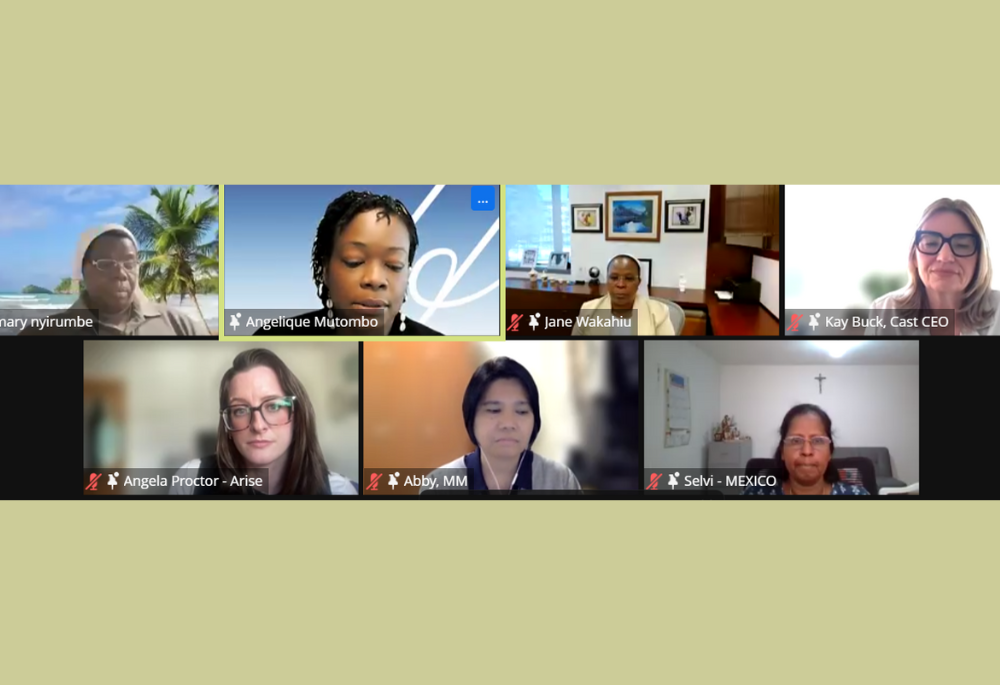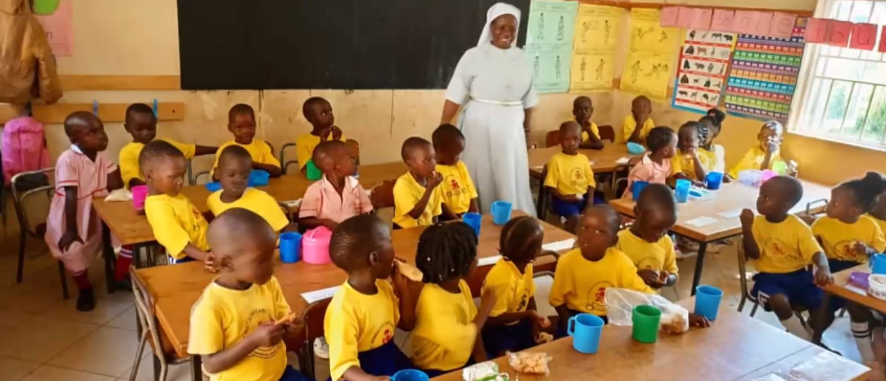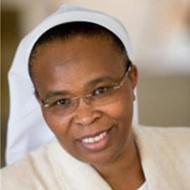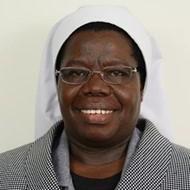
The Catholic Sisters Initiative hosted an anti-human trafficking webinar on April 16, featuring Catholic sisters and representatives of key organizations battling human trafficking across several continents. The Conrad N. Hilton Foundation sponsored the event. (GSR screenshot/Alecia Westmorland)
Esther felt full of optimism when a woman approached her several years ago, offering to take her and her friends from their homes in Nigeria to Italy for well-paying jobs.
"I was happy and wanted to go with her," said Esther, a featured speaker in an April 16 Catholic Sisters Initiative webinar on anti-human trafficking. Esther, whose full name is not being revealed to protect her identity, didn't argue when the woman advised them against telling their families, she added.
The woman didn't bring them to Italy, however, but to Ghana, where she informed the young women that they must prostitute themselves.
"That's when she threatened to kill us or sell us, if we did not agree," Esther remembered.
When the girls escaped a year later, they felt ashamed to return to their homes, she said.
But then they connected with the Committee for the Support of the Dignity of Woman, or COSUDOW, operated by several congregations of women religious in Nigeria to combat human trafficking and support survivors.
COSUDOW provided training for her friends in hairstyling, and for her in fashion design.
Now working as a fashion designer with equipment provided by the Committee for the Support of the Dignity of Woman, and saving money to pursue a science degree, Esther even helped COSUDOW intervene when she saw a trafficker luring other youths.
"By the grace of God, I am a fashion designer, [thanks to the] help given to me," she said, adding that she feels "thankful" for those working to "restore the dignity of women."
Sponsored by the Conrad N. Hilton Foundation — which provides funding support for Global Sisters Report — the webinar focused on a critical point reflected in Esther's story: eradicating human trafficking not only involves raising awareness and rescuing those in captivity, but also rehabilitating survivors and helping them reintegrate into society.
The event featured Catholic sisters and representatives of key organizations battling human trafficking across several continents, who discussed pivotal partnerships, technology and programs helping to prevent trafficking and to aid survivors.
"I ask you to reflect on how to contribute to education, skills training and other ways of engaging in [fighting] human trafficking," said Sr. Jane Wakahiu, a member of the Little Sisters of St. Francis, as well as associate vice president of programs and head of Catholic Sisters Initiative. "We will save one life at a time together."
Human trafficking affects roughly 50 million individuals every day, Wakahiu said, referencing a report published by the International Labour Organization, International Organization for Migration and the anti-trafficking human rights group Walk Free.
Issues such as political instability and natural disasters escalate trafficking, Wakahiu added, with women and children primarily targeted.
Sr. Rosemary Nyirumbe, a member of the Sisters of the Sacred Heart of Jesus in Gulu, Uganda, said she disagrees with those who only provide temporary shelter for trafficking survivors.
"To me, it's more about rehabilitation and more about education," said Nyirumbe, director of St. Monica's Girls' Tailoring Center. "I give them skills to make them self-reliant."
Her organization, featured in the documentary "Sewing Hope," provides both formal education and vocational training for women and girls rescued from captivity, many of them war refugees.

A class in Uganda includes children of human-trafficking survivors, who are successfully reentering society with the help of the St. Monica's Girls' Tailoring Center in Uganda. (Courtesy of Catholic Sisters Initiative)
She proudly displayed photos of women at her center practicing sewing and hairstyling techniques that will allow them to generate income.
"Sewing has a healing power," said Nyirumbe, whose center has helped over 3,000 women and children. "When they're sewing, they're able to get smiles on their faces. They're able to put [cloth] pieces together, and it's also about putting their own brokenness together."
She sees the women transform through becoming literate and gaining additional education, she said, adding that "it's all about giving them those skills to make them members of the community."
She highlighted a woman at the center who had escaped with her five children after being held in captivity by a rebel leader in Sudan. She is now "shining and very comfortable and happy," Nyirumbe said, as she learns hairstyling skills.
She also referenced another woman who came to the center after 26 years in captivity.
"When she came for the first time, she could not allow her face to be seen. [Now], she's transformed, very happy, she has a smile on her face," Nyriumbe said. "This has to do with being present in their life when they come back. We must share in their lives."
Her center arranges specific times for the women to bond and play with their children to rebuild positive relationships, she added.
"We're helping them love their own children and love other people, as well," she said.
Human trafficking "is a crime increasing in Mexico day by day," said Sr. Selvi Selvaraj, a member of the Holy Spirit Missionary Sisters who represents Red Rahamim, the Mexican network of religious combating human trafficking.
Operating as a member of worldwide anti-trafficking network Talitha Kum, Red Rahamim conducted an investigation confirming that numerous Mexican communities experience high rates of trafficking, Selvaraj said, especially among migrants.
"You all know the [migrant] situation in Mexico, because of the entry to Mexico from different countries," said Selvaraj, also the network representative for the Confederation of Latin American Religious.
The group's investigation led to establishing Red Rahamim branches in each affected community, Selvaraj said. With support from locals, the group focuses on efforts such as raising awareness at schools, parishes and migrant centers, as well as offering a microcredit program to empower women in vulnerable positions.
The organization's members also accompany groups of mothers searching for human trafficking victims, Selvaraj said.
"There are many children and adolescents disappearing in Mexico. The cry of mothers searching for their children is very moving," she said. "Our objective of working in Mexico is strengthening networking between consecrated persons and other social organizations committed against human trafficking."
Advertisement
Many Catholic sisters and anti-trafficking organizations have no means to quantify and demonstrate the value of their efforts, said Angela Proctor, director of the London-based Arise Foundation that works to prevent trafficking worldwide.
"Without effective data gathering and evidence of their work, groups often don't have the means to make known their contributions to communities," Proctor said. "[That] can compromise their ability to win funding in the future."
As a solution, her organization developed the MEL (Monitoring, Evaluation and Learning) app. Its straightforward format allows for those battling against trafficking to enter details about the location, intent, scope and success of their programs.
"What comes out of this is a dashboard you can access that will show graphs and graphics of the work you've achieved, that you can input into funding requests, projects and future activities," Proctor said, adding that the app will be rolled out to any organizations that wish to use it in 2025. "Our hope is this app really shows what we can learn from our activities."
Many significant efforts to address human trafficking stem from nongovernmental organizations partnering with Catholic sisters, said Kay Buck, CEO of the Coalition to Abolish Slavery and Trafficking.
The Coalition to Abolish Slavery and Trafficking, which has served thousands of human trafficking survivors and their families, has worked directly with sisters in advocacy and awareness efforts for 20 years, Buck said.
When the coalition first launched in Los Angeles, she said, "shelters throughout Southern California were very afraid to accept our clients." But when she approached shelters run by Catholic sisters, they took in the trafficking survivors immediately.
"I couldn't have served our clients without that," Buck said, adding that this led to sisters working with the coalition to later convert a convent into a shelter for trafficking survivors.
Catholic sisters further partnered with the Coalition to Abolish Slavery and Trafficking in successfully lobbying for the passing of California's Trafficking Victims Protection Act, providing greater protections and resources for survivors statewide.
"Sisters wrote to their representatives in the Senate and the assembly, then mobilized each other and their respective congregations to make this law a possibility," Buck said, adding that "whenever I have a meeting with a legislator or a policy leader, a sister almost always comes with me. They garner so much respect."
The coalition's collaboration with sisters also led to California passing the Transparency in Supply Chains Act, she said, requiring companies that do business in California to be transparent about their efforts to address slave labor in their supply chains.
"Sisters met with Gov. [Arnold] Schwarzenegger and called all their congregations to take action and sign petitions and do protests," Buck said. "This law passed because of that."
The law now has a global impact, she added, noting that many countries have since passed similar laws.
She lauded how Catholic sisters and the Coalition to Abolish Slavery and Trafficking all approach human trafficking survivors from a holistic standpoint, with respect for the whole person.
"We help survivors and help them live with the dignity they deserve, and we also look at their family and their community," Buck said. "Because of that, we're able to make such an important impact."










